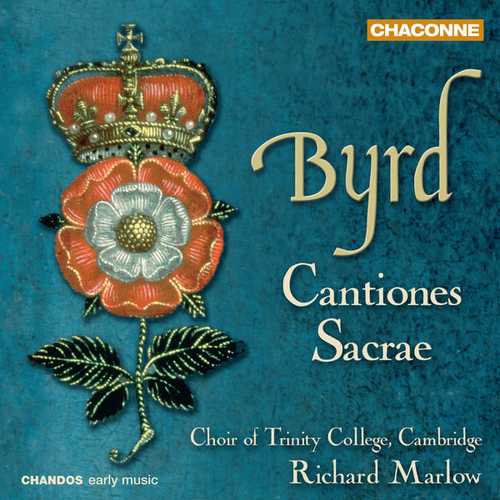

Composer: William Byrd
Performer: Choir of Trinity College Cambridge
Conductor: Richard Marlow
Format: FLAC (tracks)
Label: Chandos
Catalogue: CHAN0733
Release: 2007
Size: 997 MB
Recovery: +3%
Scan: yes
Cantiones Sacrae 1589
01. Haec Dies
02. Miserere mei, Deus
Cantiones Sacrae I
03. Laetentur coeli
04. Orietur in diebus tuis
Cantiones Sacrae 1589
05. Salve, Regina
06. Et Jesum
07. Laudibus in sanctis
08. Magnificum Domini
09. Hunc arguta canant
Cantiones Sacrae I
10. Ne irascaris, Domine
11. Civitas sancti tui
12. In resurrectione tua
Cantiones Sacrae 1589
13. Sacred songs [Cantiones Sacrae], Book II: Domine, non sum dignus
Cantiones Sacrae I
14. Vigilate
15. Domine, secundum multitudinem dolorum meorum
Cantiones Sacrae 1589
16. Domine, salva nos
17. Cantate Domino
18. Quis est homo
19. Diverre a malo
Cantiones Sacrae I
20. O quam gloriosum est regnum
21. Benedictio, et claritas
William Byrd, owing to the times in which he lived, was a composer whose public and private selves were divided in unusual and musically fascinating ways. The Latin motets included on this album were somewhere in between Byrd’s rather official Protestant service music and the underground masses. Although there were some who argued for the suppression of any music in Latin, these were pieces intended and published for noble listeners and users who were familiar with what the booklet calls the “refined” style of the sixteenth century Continental motet. And indeed Byrd with these works (published in 1589 and 1591) achieved English counterparts to the sober yet expressive motet tradition that ran from Josquin through Lassus. These a cappella sacred works fuse text and music perfectly in seamless polyphony that grows naturally out of the shape of the prayers and other utterances expressed. They are full of vivid passages that are not so much pictorial as profoundly understanding of the mood of the words. Hear for one example the large three-section setting of Ne irascaris Domine (tracks 10-12) with the uncanny gloom that settles over the image of the forsaken Jerusalem in the last part. For Catholic listeners in Protestant Britain such passages may have had special significance. If there is a single questionable aspect to this fine performance it is that the mixed-gender Trinity College Choir, Cambridge, may be too large with its 30 or so voices; it’s hard to imagine a choir of that size that would have been able to get away with singing the music in Byrd’s time. There is a personal quality to the music that comes through a bit better with a smaller group. The Trinity choristers, however, are gorgeous. They articulate the text well, without drowning it in consonant sounds, and their homogeneity of sound is spectacular. There is a sort of broad warmth in this performance that is immensely appealing and reminds the listener of why the British choral tradition continues to survive all sorts of revisionism. The bottom line is that this beautifully recorded disc makes an excellent choice for listeners who want a performance of Byrd’s motets in the traditional mold.